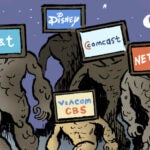DoubleVerify is looking for a home.
AdExchanger has learned that the independent verification company recently hired a banker from tech-focused investment firm Pacific Crest Securities.
Final bids were due Tuesday, and sources tell AdExchanger the deal price could be somewhere in the $350 million range – a lofty bid, though considerably less than the reported $850 million Oracle shelled out for Moat.
The independent verification space has never been hotter.
Since Moat was acquired by Oracle in April, many have expected a fast follow by one of its two main competitors – DoubleVerify and Integral Ad Science.
Potential suitors run the gamut from private equity to more strategic players like Adobe and Salesforce, which could feasibly pay a higher multiple than a private equity buyer. Nielsen could be in the running, though sources indicated it has not been active in the first round of bidding.
While advertisers have always cared about measurement, third-party independently verified measurement is having its moment, said Elgin Thompson, managing director at investment bank Digital Capital Advisors.
Marc Pritchard, Procter & Gamble’s chief brand officer, spoke for many senior marketers in late January when he castigated the walled gardens for their lack of transparency and demanded consistent adherence to the Media Rating Council’s viewability standards.
“When P&G speaks, the world is forced to listen,” Thompson said. “If you’re a company [like DoubleVerify or IAS] that has the technological capabilities to solve a problem for massive players in the ecosystem, those massive players are going to find you. Oracle and Moat is a perfect example of that.”
But while Moat is a first mover and its founders, the brothers Goodhart (CEO Jonah and co-founder Noah), are arguably the industry’s darlings, DoubleVerify often seems to bring up the rear with partner announcements.
Facebook, for example, partnered with Moat in 2015 to measure video viewability. In April of last year, Integral Ad Science and comScore were added to the mix. As of this April, Facebook was still integrating with DoubleVerify for video and display.
But there’s a reason why the MRC-accredited DoubleVerify flies under the radar, said CEO and President Wayne Gattinella, speaking at AdExchanger’s Industry Preview conference in January.
“We are a product-first company … not a PR-first company,” Gattinella said. “If we announce a product, platform or partner, it’s because it’s ready to go, it’s already been pre-tested and scaled into the marketplace.”
Beyond Viewability
Acquiring third-party measurement tech is about more than just determining whether an ad was viewable or not. Oracle’s vision with the Moat acquisition is to tie viewability to outcome, noted Eric Roza, SVP and GM of Oracle Data Cloud, at the Luma Digital Media Summit last month.
Gattinella has a similar ambition for DoubleVerify and the measurement space in general, which is poised to evolve from basic viewability tracking (whether an ad placement was delivered in the right way) to more downstream metrics (whether people engaged in a way that drove an actual outcome).
But when it comes to tying engagement to results, the industry is still facing the first batter of the first inning.
“I guess you could call that a hole,” Gattinella said at Industry Preview. “But it’s also an aspiration.”
DoubleVerify, which has revenues of roughly $70 million, has raised $46.5 million since the company was founded in 2008, most recently a $33 million venture capital round led by Institutional Venture Partners and JMI Equity.
The company’s primary remaining independent competitor, Integral Ad Science, has raised just shy of $77 million since 2009.
Although the third-party verification space is populated by a number of smaller companies, it’s basically a three-player category comprised of Moat, IAS and DoubleVerify.
“More often than not, the first and second players to get acquired in a vertical reap 90% of the value,” Thompson said. “There are only two folks left here and I would think IAS is more likely to be next. Maybe it’s for that reason that DoubleVerify is really pushing to get acquired.”
DoubleVerify did not immediately reply to a request for comment.















